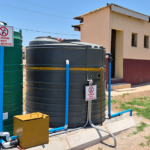How Bio Sewage Systems Are Creating Healthier Learning Environments for Rural Schools
In the heart of Steelpoort, Mpumalanga, nine schools are now experiencing a life-changing transformation. For years, these institutions have operated without access to proper sanitation. Many of these schools, which opened as early as 2000, have never known the dignity of flushable toilets. In a region grappling with severe water scarcity, the lack of adequate facilities posed not only a challenge to hygiene but also a threat to the well-being and dignity of students and educators alike.
Recognising this critical need, Bio Sewage Systems, in partnership with R&R Quantity Surveyor and with the support of the Boleng Organisation, embarked on a mission to bring sustainable sanitation solutions to these schools. Together, we installed state-of-the-art Bio Sewage Systems’ waste system, a step that goes beyond basic sanitation and embraces innovation for a more sustainable future.
The Health Implications of Communities Without Proper Sanitation
The absence of adequate sanitation is a silent crisis that affects the health, education, and overall quality of life in underprivileged communities. In areas like Steelpoort, where schools previously lacked proper toilets, the consequences have been dire:
- Spread of Waterborne Diseases: Improper waste management often contaminates local water sources, leading to diseases such as cholera, typhoid, and dysentery. These illnesses disproportionately affect children, whose health is more vulnerable to dehydration and infections.
- Hygiene Challenges and Education: Students in schools without safe facilities face increased exposure to bacteria and pathogens, leading to illnesses that disrupt attendance and learning.
- Gender Inequality: Girls, particularly those who have reached puberty, are disproportionately affected. Without access to private, clean facilities, many girls miss school during their menstrual cycles, which often leads to permanent dropout rates.
Community-Wide Impact: Poor sanitation affects entire households as contamination of water sources and food leads to widespread health issues, medical expenses, and lost productivity.
Restoring Dignity and Promoting Health Through Sustainable Solutions
The installation of Bio Sewage Systems marks a significant shift for Steelpoort’s schools. These systems provide a cleaner, safer, and more hygienic way to manage waste, ensuring that students now have access to flushable toilets—a basic human right that restores dignity and fosters a healthier learning environment.
What sets these systems apart is their water reuse capability, which addresses the region’s severe water scarcity. By enabling schools to recycle water, these systems support ongoing hygiene practices while conserving precious resources.
This innovative approach not only improves sanitation but also safeguards the health of students and the surrounding community by reducing the risks of disease and contamination. For the students of Steelpoort, these systems represent hope, opportunity, and a brighter future.
A Collaborative Effort for Sustainable Change
This project would not have been possible without the combined efforts of all involved. Bio Sewage Systems brought its technical expertise, the R&R Quantity Surveyor ensured efficient execution, and the Boleng Organisation provided the critical funding to bring this vision to life.
Together, we’re proving that when businesses, NGOs, and communities unite, we can tackle even the most pressing challenges and create lasting change.
At Bio Sewage Systems, we are proud to play a role in reshaping lives through sustainable solutions. This initiative is a reminder that addressing something as basic as sanitation can have far-reaching impacts on health, education, and community well-being.






